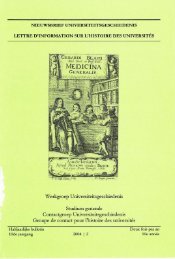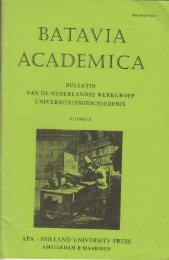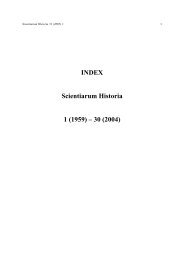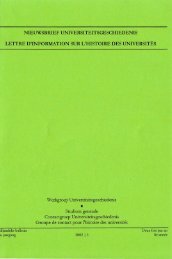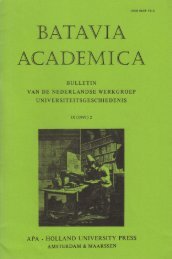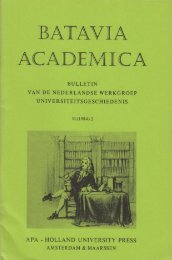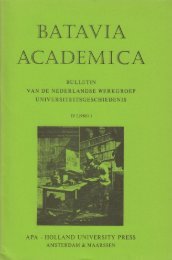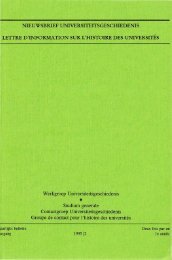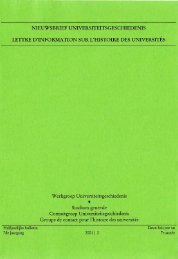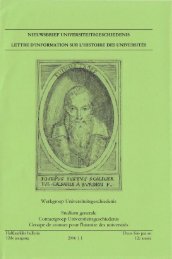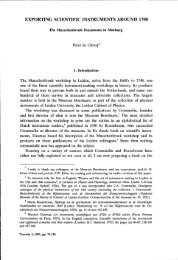the ocular harpsichord of louis-bertrand castel - Gewina
the ocular harpsichord of louis-bertrand castel - Gewina
the ocular harpsichord of louis-bertrand castel - Gewina
You also want an ePaper? Increase the reach of your titles
YUMPU automatically turns print PDFs into web optimized ePapers that Google loves.
Castel's <strong>ocular</strong> <strong>harpsichord</strong> 41<br />
become unbearable."^^<br />
This scepsis was shared by Voltaire. While preparing his famous book on <strong>the</strong><br />
Newtonian world view, Clemens de la philosophie de Neuton, Castel's ideas on<br />
colours were pointed out to him, and although he only exchanged some letters<br />
with Castel and never saw any instrument, he did enter <strong>the</strong> <strong>ocular</strong> <strong>harpsichord</strong> in<br />
his book, linking it with Newton's analogy between <strong>the</strong> widths <strong>of</strong> <strong>the</strong> various<br />
colours in <strong>the</strong> spectrum and <strong>the</strong> differences in string length for <strong>the</strong> notes <strong>of</strong> <strong>the</strong><br />
minor scale. He fully accepted <strong>the</strong> analogy between tones and colours, and even<br />
thought it gave "reason to suspect that all things in nature have <strong>the</strong>ir hidden<br />
rapports, which perhaps some day will be discovered".^ The <strong>harpsichord</strong> itself,<br />
however, could not convince him:<br />
It is no doubt to be wished that this invention will not, like so many o<strong>the</strong>rs, be an ingenious<br />
and useless effort; <strong>the</strong> rapid passage <strong>of</strong> various colours before <strong>the</strong> eyes may perhaps not fail to<br />
shock, dazzle and exhaust <strong>the</strong> sight; perhaps our eyes want some rest to be able to enjoy <strong>the</strong><br />
agreement <strong>of</strong> <strong>the</strong> colours. It is not enough to propose us a pleasure, nature must have given us<br />
<strong>the</strong> capability to admit this pleasure: it is up to experience only to judge this invention.'"*<br />
Voltaire's initial benevolence, to be sure, could not for long withstand his<br />
malicious character. It seems that Voltaire had not appreciated Castel's review<br />
Le Pour et Contre 7 (1735), pp. 14 resp. 19: "si on la depouilloit de toutes les recherches<br />
ingenieuses, & de tous les traits d'imagination dont I'Auleur a pris soin de I'omer, elle signifieroit<br />
seulement qu'entre les couleurs comme entre tous les objets de la vue & des autres sens, il y a des<br />
fondemens naturels de convenance ou d'incompatibilite, qui font que la liaison & I'assemblage de<br />
ces objets nous plait ou nous choque. C'est la-dessus qu'est fondee la plus grande partie des Arts<br />
& des Sciences, & ce principe s'etend jusqu'a VArt de la Cuisine"; "aussi leger & aussi prompt<br />
qu'il faut les concevoir dans un Clavecin cKulaire ou dans tout autre Instrument qui r^ponde aux<br />
idees du R.P. Castel, la gene & trouble la vue. jusqu'a rcndre en un moment cette pr^tendue<br />
Musique insupportable." In 1739, however, Ix Fevre de Saint-Marc, who edited <strong>the</strong> journal in that<br />
year, published in Le Pour et Contre <strong>the</strong> integral translation <strong>of</strong> Telemann's Beschreibung der<br />
Augenorgel, commenting: 'On a d'abord traite I'idee de chimcrique, mais on commence a croire<br />
aujourd'hui qu'il n'est pas impossible de la realiser." (Vol. 18, p. 313.)<br />
Voltaire, Elemens, p. 184: "donnc lieu de soup^onncr, que toutes les choses de la Nature<br />
ont des rapports caches, que peut-etre on decouvrira quelque jour."<br />
Ibid., p. 185: "II est a souhaiter sans doute, que cette invention ne soit pas, comme tant<br />
d'autres, un effort ingenieux & inutile: ce passage rapide de plusieurs couleurs devant les yeux<br />
semble peut-etre devoir etonner, eblouir, & fatiguer la vue; nos yeux veulent peut-etre du repos<br />
pour jouir de I'agrement des couleurs. Ce n'est pas assez de nous proposer un plaisir, il faut que la<br />
Nature nous ait rendus capable de recevoir ce plaisir: c'est a I'experience seule a justifier cette<br />
invention." It will come as no surprise that <strong>the</strong> <strong>harpsichord</strong> did not survive <strong>the</strong> many reprints <strong>of</strong> <strong>the</strong><br />
Elemens for long. In 1741 Voltaire added <strong>the</strong> comment: "Au reste, cette idee n'a point encore<br />
it6 executee, et I'Auteur ne suivoit pas les decouvertes de Newlon." Starting from 1748 (<strong>the</strong><br />
Dresden edition <strong>of</strong> <strong>the</strong> Oeuvres), <strong>the</strong> whole reference to <strong>the</strong> instrument was dropped. It just said:<br />
"A regard de I'analogie entre les sept couleurs primitives et les sept tons de la musique, c'est une<br />
ddcouverte qui n'est pas encore assez appr<strong>of</strong>ondie, ce qui ne peut encore mener a rien." See Part<br />
II, Ch. 13 <strong>of</strong> any edition.




